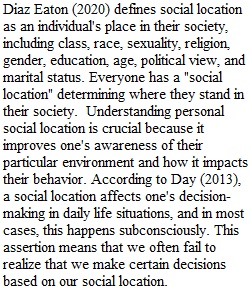


Q Introduction In this unit we have learned about social stratification within our society. As individuals we each have a unique location within these social structures that provides both privileges/opportunities and disadvantages/constraints. The purpose of this paper is to reflect on your own social location and describe your position within structural systems. Directions In a 2-3 page paper answer the following questions. • What is your social location? • How does your identity position you within systems of power, privilege, and marginalization in society? • How have social structures enabled and constrained your life and actions to this point? • Describe the intersection between your biography and history illustrating the ways in which sociological factors have shaped your life? I have provided an additional resource to help with this assignment called The Diversity WheelDownload The Diversity Wheel. This graphic will help you think through your various identities and begin to see how the social categories you belong to may provide advantage or disadvantage. The purpose of this paper is self-reflection paired with course concepts. The strongest papers will both effectively reflect on personal biography and apply sociological concepts presented in the readings and notes. Due Date Sunday 11:59 PM CT. Rubric Core Assessment Part 3 Core Assessment Part 3 Criteria Ratings Pts This criterion is linked to a Learning OutcomeIdentification of Social Location 20 pts Exceeds Expectations The student demonstrates a complete understanding of the concept of social location and was able to identity various aspects of their own identities in relation to social categories and historical/cultural context. 14 pts Meets Expectations The student demonstrates a general understanding of the concept of social location and was able to identity a few aspects of their own identities in relation to social categories and historical/cultural context. 0 pts Does Not Meet Expectations The student did not demonstrate a complete understanding of the concept of social location and was not able to identity aspects of their own identities in relation to social categories and historical/cultural context. 20 pts This criterion is linked to a Learning OutcomePrivilege and Oppression 20 pts Exceeds Expectations The student demonstrated a clear understanding of the concepts of privilege and oppression. They discussed these concepts in relation to their identities and experiences with empirical examples. 14 pts Meets Expectations The student demonstrated a vague understanding of the concepts of privilege and oppression. They struggled to relate these concepts to their identities and experiences with empirical examples. 0 pts Does Not Meet Expectations The student did not demonstrate an understanding of the concepts of privilege and oppression. They did not relate these concepts to their identities and experiences with empirical examples. 20 pts This criterion is linked to a Learning OutcomeReadability and Timely Submission 10 pts Exceeds Expectations Paper was easy to read. The paper was submitted by the deadline 7 pts Meets Expectations The paper was either easy to read or submitted on time, but not both 0 pts Below Expectations The paper was not easy to read and was not turned in on time. 10 pts Total Points: 50 PreviousNext
View Related Questions